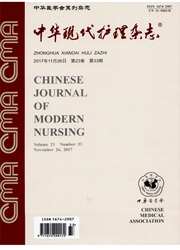

 中文摘要:
中文摘要:
目的:研究团体社交技能训练对已婚双相情感障碍患者婚姻质量的影响。方法选取2012年2月—2015年2月住院的双相情感障碍患者100例,用随机数字表法分为对照组和观察组,每组各50例,对照组给予常规护理,观察组在此基础上接受团体社交技能训练。比较两组患者的生存质量、家庭功能满意度和婚姻质量。结果观察组在心理领域、生理领域、环境领域和社会关系方面的得分均高于对照组,家庭功能满意度评分高于对照组,差异有统计学意义(P〈0.05)。观察组患者婚姻满意度评分(35.79±6.73)分、性生活(34.52±6.48)分、夫妻交流(37.22±6.26)分,均高于对照组,差异有统计学意义(P〈0.05)。结论已婚双相情感障碍患者接受团体社交技能训练,可以提高其生存质量、家庭功能满意度和婚姻质量。
 英文摘要:
英文摘要:
Objective To study the influences of group social skills training on marriage quality of married patients with bipolar disorder. Methods A total of 100 patients with bipolar disorder were selected who hospitalized from February 2012 to February 2015, and they were divided into control group and observation group randomly, each with 50 cases. The patients of control group were given routine nursing care, while the patients of observation group were given group social skills training on the basis of routine nursing. Quality of life, family function satisfaction and marital quality were compared between two groups. Results In the observation group, the scores of the patients in the fields of psychology, physiology, environment, and social relationship were higher than that in the control group. Score of family function satisfaction was significantly higher than that of the control group (P 〈0. 05). In the observation group, the patients′ scores of marital satisfaction (35. 79 ± 6. 73), sexual life (34. 52 ± 6. 48) and husband-wife communication (37. 22 ± 6. 26) were higher than those in control group (P〈0. 05). Conclusions Group social skills training in married people with bipolar disorder can improve their quality of life, satisfaction of family function and marital quality.
 同期刊论文项目
同期刊论文项目
 同项目期刊论文
同项目期刊论文
 期刊信息
期刊信息
